Nearly two decades after the unification of the German Democratic Republic (GDR) and the Federal Republic of Germany (FRG), Germans in the east and the west continue to express positive opinions about their country’s reunification, and a solid majority of east Germans say they are better off as a result of unification.
At the same time, more than eight-in-ten in the former East Germany and a smaller but solid majority in the former West Germany say those in east Germany have not achieved the same standard of living as those living in the west. And there is still a widespread feeling in the east that east Germany was overwhelmed and taken over by west Germany in the process of unification.
Positive Views of Unification
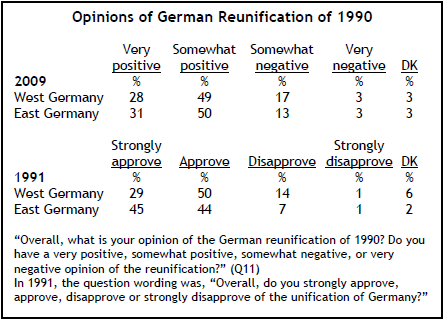
About eight-in-ten in east Germany (81%) and just slightly fewer in the west (77%) say they have a positive opinion of the reunification of 1990, but those in the former GDR are not as highly enthusiastic about the merger of the two Germanys as they were in 1991. Just months after Germany was officially reunified, more than four-in-ten east Germans (45%) said they strongly approved of the unification of Germany. Today, about three-in-ten (31%) say they have a very positive view of the reunification. The decline in enthusiasm among east Germans is evident across most demographic groups.
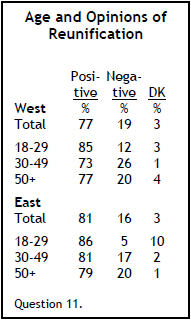
In both east and west Germany, those who are old enough to remember the sequence of events from 1989 through 1991 express somewhat more negative opinions of their country’s reunification than do those who were not yet born or who were young children at that time. In east Germany, 17% of those between ages 30 and 49 and one-in-five of those who are 50 or older have a negative view of the reunification. By contrast, just 5% of those under 30 have a negative view of the unification. Similarly, about a quarter (26%) of west Germans in the 30-to-49 age group and 20% of those 50 or older have a negative opinion of their country’s reunification, compared with 12% of those under 30.
Was Germany Unified Too Quickly?
Despite their overall positive views of their country’s reunification, Germans in both the east and the west are somewhat split when asked if Germany was unified too quickly or if it was important that Germany be unified as quickly as possible. Half in east Germany and about the same share in west Germany (52%) say it was important for unification to take place quickly; 46% and 44%, respectively, feel that unification happened too quickly.
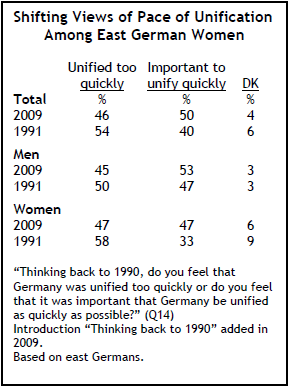
Opinions about the pace of unification have changed considerably in east Germany since 1991, when 54% thought unification had happened too quickly and 40% said it was important for Germany to be unified as quickly as possible. The change is smaller in the west, where in 1991 48% thought the nation was unified too quickly and 42% said it was important to move quickly.
The shift in the east is especially notable among women. In 1991, nearly six-in-ten (58%) women in east Germany said the GDR and the FRG were merged too quickly, and just one-third said it was important for the two Germanys to be merged as quickly as possible. Today, women in east Germany are evenly split, with 47% offering each view.
The view that it was important for Germany to be unified as quickly as possible is widespread among those who were young children or who were born since reunification. In east Germany, nearly six-in-ten of those under 30 (59%) share that view, as do 69% of young west Germans. In contrast, fewer than half of those 50 or older in east Germany say it was important for unification to happen as quickly as possible (46%), as do half of those in the same group in the west.
Most in East Germany Say GDR Was Overwhelmed
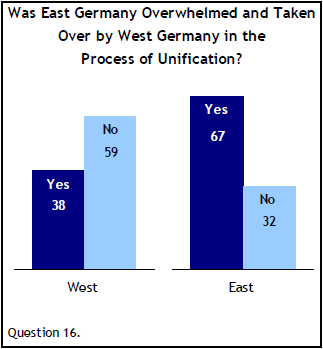
When asked if they think East Germany was overwhelmed and taken over by West Germany in the process of unification, those in the west and in the east express widely different views. Two-thirds of those in the east say that the former GDR was overwhelmed and taken over by West Germany, about the same share that said that was the case in 1991 (71%). By contrast, a solid majority in the west (59%) says East Germany was not overwhelmed and taken over by West Germany, and 38% say it was (west Germans were not asked this question in 1991).
Young Germans are significantly less likely than those in older age groups to say that East Germany was taken over in the process of unification, and the generation gap is especially dramatic among east Germans. A majority of east Germans under 30 (56%) say they do not feel that East Germany was overwhelmed by West Germany, while solid majorities of those ages 30 to 49 (69%) and those 50 or older (74%) feel that East Germany was, in fact, overwhelmed and taken over when the two Germanys were unified.
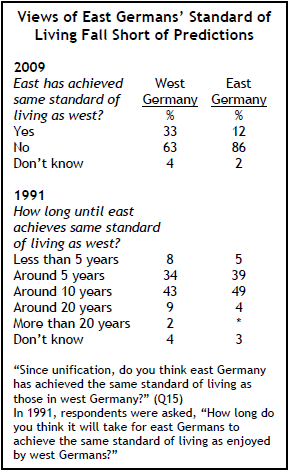
Majorities of west Germans in all age groups say East Germany was not overwhelmed by East Germany in the process of unification, but the share of those under 30 who share that view is especially high. Seven-in-ten in the younger age group say the east was not overwhelmed by the west, compared with 53% of west Germans ages 30 to 49 and 59% of those 50 or older.
Standard of Living in East Germany
Views about the standard of living in east Germany are much more negative than the predictions Germans made in the year following reunification – and the predictions have fallen especially short in the east. More than eight-in-ten (86%) in east Germany currently say that those in the east have not achieved the same standard of living as those in the west, while just 12% say the standard of living is the same in the two regions. In 1991, more than nine-in-ten east Germans (93%) expected the east to achieve the same standard of living as the west within about a decade, and almost all (97%) thought it would happen within about 20 years.
A majority of those in the west (63%) also say that their neighbors to the east have not achieved the same standard of living, but a substantial minority (33%) sees things differently. Nearly two decades ago, 85% in west Germany said they expected the standard of living in east Germany to catch up with that of west Germany within around 10 years, and 94% thought it would happen within around 20 years.
Life After Reunification
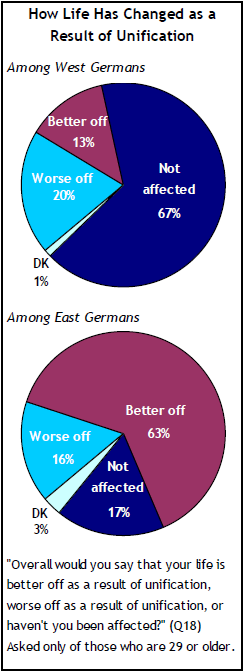
Despite the widespread opinion that east Germany has not achieved the same standard of living as west Germany, 63% in the east say they are better off as a result of unification; 16% say they are worse off, and 17% say their lives have not been affected.2 In contrast, two-thirds (67%) in west Germany say that they have been unaffected, while 20% say unification has left them worse off and 13% say they are better off.
More in the east now say that their lives are better off as a result of reunification than did so in 1991. About half (48%) said that was the case 18 years ago, while 23% said they were worse off. The percentage in the west that says their lives have not been affected by unification is virtually unchanged from 1991 (67% vs. 70%).
Compared with 1991, east Germans across all demographic groups are now more likely to say their lives are better off as a result of unification, but the gains are especially large among women and people in rural areas. The share of women in the east who say they are better off has increased by 20 percentage points (62% now vs. 42% in 1991). By contrast, 65% of men in the east now say their lives are better off, compared with 55% in 1991. The same percentage in rural and urban parts of east Germany now say their lives are better off (63%); nearly two decades ago, just 39% in rural areas shared that view, while 51% of urban dwellers did so.




